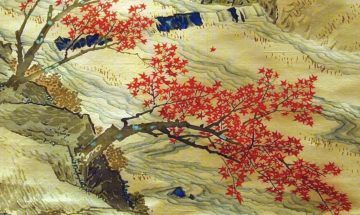Pico Iyer in Literary Hub:
 I long to be in Japan in the autumn. For much of the year, my job, reporting on foreign conflicts and globalism on a human scale, forces me out onto the road; and with my mother in her eighties, living alone in the hills of California, I need to be there much of the time, too. But I try each year to be back in Japan for the season of fire and farewells. Cherry blossoms, pretty and frothy as schoolgirls’ giggles, are the face the country likes to present to the world, all pink and white eroticism; but it’s the reddening of the maple leaves under a blaze of ceramic-blue skies that is the place’s secret heart.
I long to be in Japan in the autumn. For much of the year, my job, reporting on foreign conflicts and globalism on a human scale, forces me out onto the road; and with my mother in her eighties, living alone in the hills of California, I need to be there much of the time, too. But I try each year to be back in Japan for the season of fire and farewells. Cherry blossoms, pretty and frothy as schoolgirls’ giggles, are the face the country likes to present to the world, all pink and white eroticism; but it’s the reddening of the maple leaves under a blaze of ceramic-blue skies that is the place’s secret heart.
We cherish things, Japan has always known, precisely because they cannot last; it’s their frailty that adds sweetness to their beauty. In the central literary text of the land, The Tale of Genji, the word for “impermanence” is used more than a thousand times, and bright, amorous Prince Genji is said to be “a handsomer man in sorrow than in happiness.” Beauty, the foremost Jungian in Japan has observed, “is completed only if we accept the fact of death.” Autumn poses the question we all have to live with: How to hold on to the things we love even though we know that we and they are dying. How to see the world as it is, yet find light within that truth.
More here.
